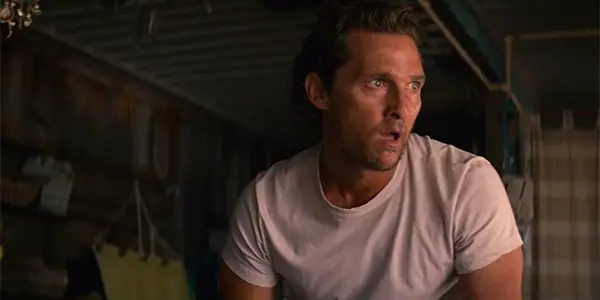Welcome To The Real McConaissance

Jonathan Coffman is a writer and editor from Lexington, KY.…
When the history books are written, the first half of this decade in America will be remembered as the time of Matthew McConaughey. From 2011 to early 2014, the Texas actor was working through a notable career revival that quickly became known as The McConaissance. The world belonged to McConaughey, the rest of us were just living in it. And thankfully, that’s all over now.
This was all The Lincoln Lawyer’s fault. Following a decade of romantic comedies and box office tracking, McConaughey started taking roles that scared him, working with bold filmmakers and up-and-comers. Sounds like a good plan on paper. However, it led to varied results. After winning an Oscar for leading the stale Dallas Buyers Club, the McConaissance relapsed due to one role some would call his best work.
This rejuvenated run culminated in HBO’s 2014 crime drama True Detective, where McConaughey stood up straight, adjusted his tie, and demanded to be taken seriously. As engrossing and impressive as that performance is, it taught Hollywood and everyone following along all the wrong lessons about the actor.
True Detective’s Rust Cole is a dry, fun-sucking nihilist, the antithesis of everything we know McConaughey to be. In the show, it’s hypnotizing. In the hands of writer Nic Pizzolato and director Cary Fukunaga, who infamously only participated in the show’s first season, McConaughey gives himself over to this character and worldview fully. Seeing Rust brought to life was the final step in breaking audience expectations. But the conclusion should have been simple: this is an actor with incredible range, let’s pair him with gifted filmmakers. Instead, Hollywood ushered him into bloated, darker pieces as a stick in the mud chasing critical approval.

While many of the actor’s choices felt bold during this period’s peak, so few of them feel truly inspired in hindsight. His turn away from matinee fare in The Lincoln Lawyer showed the life in his eyes, but it was merely a spark in a movie lacking true fireworks. Later dramatic turns in Interstellar and Dallas Buyers Club stunt the actor’s visceral charm, each reducing him to Christopher Nolan leading man blankness and true life turned physical transformation Oscar bait.
McConaughey finds his moments to shine in both films but The McConaissance’s misguided expectations pushed the actor into films outside his element, often working with one arm tied behind his back. In these films, there is no room for his charm, no time to spare for “Alright, alright, alright.” He was so rarely asked to do what he does best that those in charge forgot why we like him in the first place.
After True Detective, the work nose-dived. Each doomsday line of dialogue from Rust Cole buried McConaughey that much deeper in the no-fun zone, and his later projects show it. The following years offered starring roles in bleak projects such as The Sea of Trees, Free State of Jones, Gold, and The Dark Tower, each offering less of a point of view than the last. Audiences were so fascinated by the actor’s newfound chops that he was pushed toward typical Serious Actor™ material rather than collaborators with an interesting take on his appeal. Unfortunately, the material he landed on was rarely as substantial as one would hope for.
An Unlikely Rejuvenation
When we look back at the actor’s career, the true turning point toward pure, distilled McConaughey will have come when he decided to take scarier, riskier roles, just as he intended. Except that turn won’t be marked by The Lincoln Lawyer. It will be for Serenity, an instant so-bad-it’s-good classic.
Or is it? Serenity is too engaging to write off as pure schlock, but I’m no fool. Arguing that Serenity is good is one thing. One cannot reasonably argue that it isn’t ridiculous. In Steven Knight’s island neo-noir film, the writer and director places McConaughey in the center of his story. He leads as Baker Dill, a fishing boat captain visited by his ex-wife (Anne Hathaway) with stories of her abusive, buffoonish husband (Jason Clarke) and an offer for Baker to take him out to sea and kill him for $10 million. Anyone that has seen Serenity and recommends it will leave it at that, as it’s become well-known for its infamous twists and turns.
No matter how far Serenity strays from logic or good reason, it’s hard to deny how fun it is to watch. And this fun never comes at the expense of the film, in the way that The Room is often mocked. Knight’s third film may be ridiculous but everyone on set is buying in and committing to the bit. With a cast this talented and willing to play ball, any half-baked story can at least be bought as pure entertainment, if not up to snuff for thorough analysis.
McConaughey stands out for operating at the same frantic frequency the movie is pitched at. In one scene he is a fisher boat captain, the next he is sleeping with women for money and jumping off cliffs naked. In any case, McConaughey is utterly out of his mind here, his eyes bugging out and snapping at others as the deranged Baker Dill.
It is difficult to tell whether Knight’s directing teases this madness out of McConaughey or if he’s summoned that all on his own. Regardless, Baker Dill feels like the actor’s most engaged performance since True Detective, and his wide-eyed recklessness feels like a product of waking up antsy from his recent drowsy run.

If McConaughey was jolted awake by Serenity, then he’s cooled down to his ultimate zen in The Beach Bum. Working with another goofball writer-director, the actor gives himself over to Harmony Korine for a caricature of drug-fueled vacation life that only he could fulfill.
Like Serenity before it, The Beach Bum doesn’t have a tight grip on story. In fact, it’s essentially plotless. McConaughey stars as the quintessential vagabond poet Moondog on a quest to finish his novel and save his home. In 1999, the actor was arrested for wandering the streets naked playing bongos himself, so it’s the natural role of a lifetime. McConaughey’s Moondog is a fast and loose turn that lifts the weight of the so-called McConaissance off his shoulders. Most importantly, it takes advantage of the undeniably fun parts of the actor’s persona and talent.
The Beach Bum is much better off without interrogating who Moondog is or the wave he’s riding on. The audience’s reward is living life on a whim through the eyes of its lead and the carousel of oddballs passing through his life. It’s a hangout movie in the same vein as Dazed and Confused but warped through the senses of Korine and his twisted take on what McConaughey could actually be like. In the strangest outcome, it is the most true performance to his own sensibilities in years.
Industry-Wide Concerns
McConaughey’s struggle to find a proper sense of self this decade is reflective of Hollywood’s current issues. Since Avatar planted its flag in the zeitgeist with nearly $2.8 billion and Marvel launched a wide-ranging cinematic universe, movie studios have grown bored with mid-tier budgets and moderate success. Why make a film for $40 million and aim for a $150 million box office when you could spend $250 million and hope to near $1 billion?
Well, you do it for the McConaugheys. The actor is a prime example of performers exiled by the industry’s lack of interest in romantic comedies or modest dramas. In this age, you need to make a cult classic on a shoestring budget or reach for the stars with risky investments. Usually, you wind up with The Dark Tower. The actor has been caught in the cross-hairs of many similar disasters where no one left happy, most importantly the audience.
Hollywood be damned, McConaughey is making choices now. In his next role, the actor has signed on to star in The Brigands of Battle Creek, an “ultra-violent” western from Old Boy director Park Chan-Wook and controversial writer S. Craig Zahler. With enough cracks at interesting roles, wider audiences and the industry are bound to take notice of his newfound approach. In due time, we will all rejoice in celebrating the real McConaissance.
Does content like this matter to you?
Become a Member and support film journalism. Unlock access to all of Film Inquiry`s great articles. Join a community of like-minded readers who are passionate about cinema - get access to our private members Network, give back to independent filmmakers, and more.
Jonathan Coffman is a writer and editor from Lexington, KY. He is a graduate of University of Kentucky's journalism program. His entertainment writing has appeared on Stranger Beers but we don't talk about that anymore.













